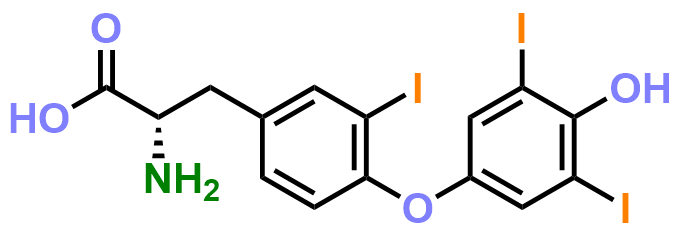3,3',5-Triiodo-L-Thyronine Analysis Service
- Identifying and quantifying 3,3',5-triiodo-L-thyronine in biological samples
- Studying the role of 3,3',5-triiodo-L-thyronine in metabolic pathways
- Providing basis for drug development and therapeutic strategies
- Animal tissue ≥ 50 mg
- Plant tissue ≥ 100 mg
- Serum/ Plasma ≥ 100 μL
- Urine ≥ 1 mL
3,3',5-Triiodo-L-thyronine (also known as T3) is a thyroid hormone with the molecular formula C15H12I3NO4. This compound is characterized by an amino acid backbone derived from tyrosine, with three iodine atoms attached at the 3, 3', and 5 positions on its aromatic rings, giving it its unique structure and biological activity. 3,3',5-Triiodo-L-thyronine is an active thyroid hormone that plays a crucial role in regulating metabolism, growth, and development. It is produced by the thyroid gland either directly or through the peripheral conversion of thyroxine (T4), a less active thyroid hormone, by the enzyme iodothyronine deiodinase. T3 exerts its biological effects by binding to thyroid hormone receptors (THRs) in the cell nucleus, regulating the expression of target genes involved in various metabolic processes, such as energy expenditure, lipid and carbohydrate metabolism, and thermogenesis.
Elevated or reduced levels of 3,3',5-triiodo-L-thyronine can indicate thyroid dysfunctions such as hyperthyroidism or hypothyroidism. Hyperthyroidism, characterized by excessive levels of T3, can lead to symptoms like weight loss, increased heart rate, and anxiety, while hypothyroidism, characterized by insufficient T3 levels, can cause fatigue, weight gain, and depression. Monitoring the levels of T3, along with other thyroid hormones, is essential for diagnosing and managing these thyroid disorders. Analytical methods, such as immunoassays, high-performance liquid chromatography (HPLC), and liquid chromatography-tandem mass spectrometry (LC-MS/MS), are commonly used to detect and quantify 3,3',5-triiodo-L-thyronine in biological samples, including blood serum. These methods provide high sensitivity, specificity, and accuracy for evaluating thyroid function and managing thyroid-related diseases.

Figure 1. The Structure of 3,3',5-Triiodo-L-Thyronine
At MtoZ Biolabs, we utilize advanced liquid chromatography-mass spectrometry (LC-MS) platform to provide precise and sensitive 3,3',5-Triiodo-L-Thyronine Analysis Service. Our expert metabolomics team ensures the accuracy and reliability of the results.
Analysis Workflow
Service Advantages
1. Continuously optimized experimental protocols and advanced instrument
2. Professional experimental design
3. Rapid turnaround time
4. High accuracy, specificity, and sensitivity
Applications
Sample Submission Requirements
1. Sample Types
Serum, plasma, urine, tissues, and other biological samples. It is necessary to select more than 3 materials with the same condition for each sample.
2. Sample Volume
3. Sample Preservation
Store at -80°C to maintain stability.
Note: Provide details on sample collection and handling.
Deliverables
1. Experimental Procedures
2. Relevant Liquid Chromatography and Mass Spectrometry Parameters
3. Detailed Information on 3,3',5-Triiodo-L-Thyronine
4. Raw Data
5. Custom Analysis Report
Our 3,3',5-triiodo-L-thyronine analysis service aims to accelerate your research and product development processes by providing accurate and reliable results.
How to order?







